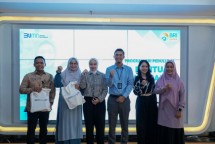Exploring The Indonesian Market: Opportunities and Strategies for Chinese Electric Equipment Manufacturers
Oleh : Yang Hongkun, Master Of Technology Management, Faculty Business, President University | Kamis, 16 Mei 2024 - 15:07 WIB

Industri manufaktur (Ilustrasi)
INDUSTRY.co.id - China has solidified its position as a global leader in manufacturing, particularly in the electric equipment sector. With advancements in technology, production capabilities, and competitive pricing, Chinese electric equipment manufacturers are well-positioned to expand their international reach.
Indonesia, with its rapidly growing economy and increasing demand for electricity and modern infrastructure, presents a lucrative market for Chinese electric equipment manufacturers. This essay explores the opportunities and strategies for Chinese electric equipment manufacturers aiming to enter and succeed in the Indonesian market.
Market Opportunities in Indonesia
1. Growing Demand for Electricity:
Indonesia's economic growth and urbanization have led to a substantial increase in electricity demand. The Indonesian Ministry of Energy and Mineral Resources projects that the country’s electricity consumption will grow by 6.9% annually over the next decade. This growing demand creates significant opportunities for electric equipment manufacturers to supply the necessary infrastructure, including generators, transformers, and transmission equipment.
2. Government Initiatives and Investments:
The Indonesian government has launched several initiatives to boost the energy sector. The ambitious "35,000 MW" program aims to increase the country’s electricity capacity significantly. This initiative includes substantial investments in power plants, transmission, and distribution networks, opening avenues for Chinese manufacturers to provide essential equipment. Additionally, Indonesia's National Energy Policy outlines plans to enhance the electricity grid, further increasing demand for modern electric equipment.
3. Renewable Energy Sector:
Indonesia is focusing on expanding its renewable energy capacity, targeting 23% of its energy mix from renewables by 2025. This shift creates opportunities for Chinese manufacturers specializing in solar, wind, and hydroelectric power equipment. As Indonesia invests in sustainable energy projects, Chinese firms with expertise in renewable technologies can play a crucial role in the country's energy transformation.
4. Competitive Advantage:
Chinese manufacturers are renowned for their cost-effective solutions and technological innovations. Their ability to offer high-quality equipment at competitive prices provides a significant advantage in price-sensitive markets like Indonesia. Furthermore, China's experience in large-scale manufacturing ensures they can meet the demands of a growing market efficiently.
Strategic Approaches to Entering the Indonesian Market
1. Market Research and Entry Strategy:
Conducting thorough market research is crucial to understand the specific needs and regulatory environment of the Indonesian market. Chinese companies should assess the competitive landscape, identify key stakeholders, and tailor their products to meet local standards and preferences. Establishing a local presence, either through joint ventures or wholly-owned subsidiaries, can facilitate smoother market entry and integration into the local business ecosystem.
2. Partnerships and Collaborations:
Forming strategic alliances with local companies can be beneficial. Partnerships with Indonesian firms can help Chinese manufacturers navigate the regulatory environment, establish distribution networks, and gain insights into local market dynamics. Collaborations with local energy providers, construction companies, and government agencies can enhance market penetration and provide mutual benefits.
3. Focus on Quality and Compliance:
Ensuring that products meet Indonesian standards and certifications is critical. Chinese manufacturers should invest in quality assurance and compliance to build trust with Indonesian consumers and stakeholders. Demonstrating a commitment to high standards can differentiate them from competitors and establish a strong market reputation. Adhering to local regulations and obtaining necessary certifications will also prevent legal and operational issues.
4. Marketing and Brand Building:
Building a strong brand presence through targeted marketing campaigns is essential. Highlighting the technological advancements, reliability, and cost-effectiveness of Chinese electric equipment can attract potential buyers. Participating in trade shows, energy conferences, and exhibitions in Indonesia can increase visibility and credibility. Utilizing digital marketing strategies, including social media and online advertising, can also reach a broader audience and generate leads.
5. After-Sales Support and Services:
Providing robust after-sales support, including maintenance, training, and customer service, can enhance customer satisfaction and loyalty. Establishing service centers and training programs in Indonesia can ensure that customers receive prompt and efficient support. This approach not only improves customer relations but also fosters long-term business relationships and repeat business.
Challenges and Mitigation Strategies
1. Regulatory and Political Risks:
Navigating the regulatory environment in Indonesia can be challenging. Chinese companies must stay informed about policy changes and engage with local authorities to ensure compliance. Developing strong relationships with regulatory bodies and local partners can mitigate political and regulatory risks. Additionally, employing local legal experts can help navigate the complexities of Indonesian regulations.
2. Cultural and Language Barriers:
Understanding cultural nuances and overcoming language barriers are essential for successful market entry. Employing local staff, translators, and cultural advisors can help Chinese companies better connect with Indonesian stakeholders and customers. Cultural sensitivity training for Chinese staff can also improve interactions and business negotiations.
3. Economic Fluctuations:
Economic instability and currency fluctuations can impact business operations. Diversifying investments and adopting flexible business models can help mitigate economic risks. Additionally, leveraging export financing and insurance options can protect against financial uncertainties. Establishing a local supply chain can also reduce dependency on imports and buffer against currency volatility.
Conclusion
Indonesia presents a promising market for Chinese electric equipment manufacturers, driven by growing electricity demand, government initiatives, and a focus on renewable energy. By conducting thorough market research, forming strategic partnerships, focusing on quality and compliance, and investing in marketing and after-sales support, Chinese manufacturers can successfully tap into this burgeoning market. Despite potential challenges, the strategic approach outlined can help Chinese companies navigate the complexities and capitalize on the opportunities in Indonesia’s dynamic electric equipment sector. With careful planning and execution, Chinese electric equipment manufacturers can establish a strong foothold in Indonesia, contributing to the country's energy infrastructure development and sustainable growth.
Baca Juga
Bank Indonesia Terus Lakukan Inovasi Transformasi Ekonomi Digital
FEKDI x KKI 2024, Mewujudkan Inklusi Keuangan dan Ekonomi Digital…
FEKDI x KKI 2024 : Inovasi Ekonomi dan Keuangan Digital
Transformasi Inklusi Keuangan di Indonesia: Peran AI dalam Meningkatkan…
FEKDI 2024 Perlihatkan Keberhasilan Sistem Ekonomi Digital dalam…
Industri Hari Ini

Jumat, 01 November 2024 - 06:55 WIB
Tingkatkan Daya Saing, BRI Peduli Gelar Pelatihan dan Sertifikasi Halal UMKM dari Berbagai Daerah
BRI terus memberikan dukungan bagi pelaku Usaha Mikro, Kecil dan Menengah untuk dapat bersaing di pasar dan naik kelas. Melalui BRI Peduli selaku payung dari program Tanggung Jawab Sosial dan…

Kamis, 31 Oktober 2024 - 22:53 WIB
CSAP Terus Ekspansi Ritel Modern, MITRA10 dan Atria Kini Hadir di Kendari
Kendari- Mitra10 dan Atria terus ekspansi agresif memperkuat pasar ritel modern bahan bangunan, perlengkapan rumah, aneka furnitur, matras dan perabotan rumah di Kendari, Sulawesi Tenggara.…
Kamis, 31 Oktober 2024 - 22:43 WIB
Super Indo Raih Sertifikat Halal, Tunjukkan Komitmen pada Kepercayaan dan Kualitas Produk
Sertifikasi ini menjadi bukti komitmen Super Indo dalam memastikan kehalalan dan kualitas produk yang disediakan, serta memperkuat kepercayaan pelanggan.

Kamis, 31 Oktober 2024 - 22:36 WIB
Laba Bersih WOM Finance Tumbuh 7% pada Q3-2024
PT Wahana Ottomitra Multiartha Tbk (WOMF) atau WOM Finance, hari ini mengumumkan kinerja keuangan yang positif pada kuartal-III tahun 2024.

Kamis, 31 Oktober 2024 - 22:15 WIB
Ichitan Mendadak Jutawan 3, Suami dan Istri Penjual Seblak di Bekasi Raih Rp300 Juta
Kepada Mr Ichitan, Dimas mengaku hadiah Rp300 juta akan ia gunakan secara maksimal. Mulai dari membayar hutang, memperbaiki rumahnya yang bocor dan banyak rayap, juga nambal modal usaha.


















Komentar Berita